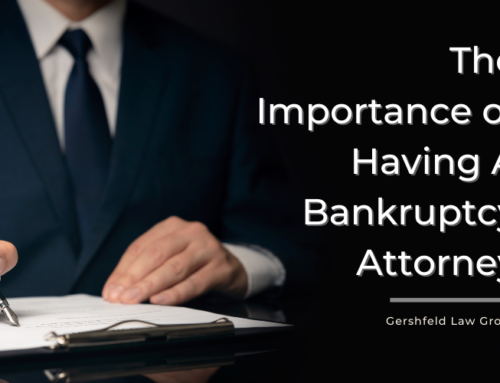Bankruptcy is a complex issue with both positive and negative consequences.
Bankruptcy can be a complex process, and the average person probably isn’t equipped to go through it alone.Working with a bankruptcy attorney can help ensure your bankruptcy goes as smoothly as possible and complies with all the applicable rules and regulations governing bankruptcy proceedings.
Credit Score
A bankruptcy filing typically depresses a person’s credit score. Also, bankruptcy won’t erase the history of your past debts, even if the debt itself is discharged. Lenders will take all this as a sign that you’re a risky borrower, and you could end up with high-interest rates for loans—if you even qualify for them at all.
While this is a legitimate concern, one may slowly rebuild their credit after the bankruptcy. The bankruptcy will remain on your credit report for many years, but the net effect of bankruptcy on credit scores is typically positive. That’s because, while bankruptcy takes a bite out of your credit score, as does growing debt. If bankruptcy is your only way to stop debt from growing, it may be worth taking the hit to your credit score, to build it back up over time.
Cost
Bankruptcy costs anywhere from a few hundred dollars to a few thousand. You have a few payment options.You’ll face two expenses: the court filing fees, and attorney fees for the bankruptcy lawyer who files your petition, helps you through the means test and represents you in court. Costs that must be considered and vary include:
- Court Filing Fee- Chapter 7 bankruptcy filing fee is $335.00
- Bankruptcy Attorney Fee- Most attorneys handle Chapter 7 bankruptcy cases on a flat fee
- Credit Counseling- Everyone who files for bankruptcy must take two educational courses. These courses average $50 per course.
If you are already in a tight situation, these fees can add up fast. he total cost will largely depend on your financial situation, the complexity of your case, and whether you file Chapter 7 or Chapter 13 bankruptcy.
Privacy
A negative consequence of filing for bankruptcy is that everything you file with the court—including all of your bankruptcy schedules, which contain your personal financial information—can be accessed by the public. That means friends, family, employers, and clients could find out the details about how much money you owed to who. For some individuals, this is a deal-breaker.
Bankruptcy Statistics
- Chapter 7 bankruptcies are consistently the most common, although they’ve gone down since the passage of the Bankruptcy Abuse Prevention and Consumer Protection Act in 2005.
- The most common contributing factor to bankruptcy is a loss of income.
- Bankruptcy is more common among lower-income debtors, especially those who make $30,000 or less per year.
- The average age of a bankruptcy filer in the U.S. increased from 44.4 years in 2007 to 48.5 years less than a decade later
- Bankruptcy filings fell by 1.1 percent for the 12-month period ending March 31, 2020, compared with the year ending March 31, 2019.
While deciding if bankruptcy is the right thing to do, keep these in mind. Before you schedule an appointment with an attorney or law group, you can familiarize yourself with these basic consequences for any bankruptcy case.







